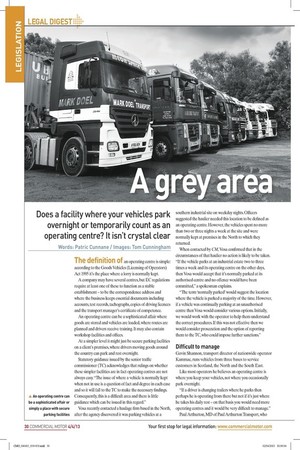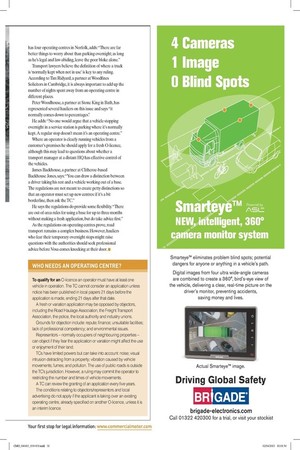Does a facility where your vehicles park overnight or temporarily
Page 19

Page 20

If you've noticed an error in this article please click here to report it so we can fix it.
count as an operating centre? It isn't crystal clear Words: Patric Cunnane / Images: Tom Cunningham The definition of an operating centre is simple: according to the Goods Vehicles (Licensing of Operators) Act 1995 it's the place where a lorry is normally kept.
A company may have several centres, but EC regulations require at least one of these to function as a stable establishment — to be the correspondence address and where the business keeps essential documents including accounts, test records, tachographs, copies of driving licences and the transport manager's certificate of competence.
An operating centre can be a sophisticated affair where goods are stored and vehicles are loaded, where routes are planned and drivers receive training. It may also contain workshop facilities and offices.
At a simpler level it might just be secure parking facilities on a client's premises, where drivers moving goods around the country can park and rest overnight.
Statutory guidance issued by the senior traffic commissioner (TC) acknowledges that rulings on whether these simpler facilities are in fact operating centres are not always easy. "The issue of where a vehicle is normally kept when not in use is a question of fact and degree in each case and so it will fall to the TC to make the necessary findings.
An operating centre can Consequently, this is a difficult area and there is little be a sophisticated affair or guidance which can be issued in this regard."
simply a place with secure Vosa recently contacted a haulage firm based in the North, parking facilities after the agency discovered it was parking vehicles at a southern industrial site on weekday nights. Officers suggested the haulier needed this location to be defined as an operating centre. However, the vehicles spent no more than two or three nights a week at the site and were normally kept at premises in the North to which they returned.
When contacted by CM, Vosa confirmed that in the circumstances of that haulier no action is likely to be taken. "If the vehicle parks at an industrial estate two to three times a week and its operating centre on the other days, then Vosa would accept that it's normally parked at its authorised centre and no offence would have been committed," a spokesman explains.
"The term 'normally parked' would suggest the location where the vehicle is parked a majority of the time. However, if a vehicle was continually parking at an unauthorised centre then Vosa would consider various options. Initially, we would work with the operator to help them understand the correct procedures. If this was not effective then we would consider prosecution and the option of reporting them to the TC, who could impose further sanctions."
Difficult to manage Gavin Shannon, transport director of nationwide operator Kammac, runs vehicles from three bases to service customers in Scotland, the North and the South East.
Like most operators he believes an operating centre is where you keep your vehicles, not where you occasionally park overnight.
"If a driver is changing trailers where he parks then perhaps he is operating from there but not if it's just where he takes his daily rest — on that basis you would need more operating centres and it would be very difficult to manage."
Paul Arthurton, MID of Paul Arthurton Transport, who has four operating centres in Norfolk, adds: "There are far better things to worry about than parking overnight; as long as he's legal and law-abiding, leave the poor bloke alone."
Transport lawyers believe the definition of where a truck is 'normally kept when not in use' is key to any ruling. According to Tim Ridyard, a partner at Woodfines Solicitors in Cambridge, it is always important to add up the number of nights spent away from an operating centre in different places.
Peter Woodhouse, a partner at Stone King in Bath, has represented several hauliers on this issue and says "it normally comes down to percentages': He adds: "No one would argue that a vehicle stopping overnight in a service station is parking where it's normally kept. A regular stop doesn't mean it's an operating centre."
Where an operator is clearly running vehicles from a customer's premises he should apply for a fresh 0-licence, although this may lead to questions about whether a transport manager at a distant HQ has effective control of the vehicles.
James Backhouse, a partner at Clitheroe-based Backhouse Jones, says: "You can draw a distinction between a driver taking his rest and a vehicle working out of a base. The regulations are not meant to create petty distinctions so that an operator must set up new centres: if it's a bit borderline, then ask the TC."
He says the regulations do provide some flexibility. "There are out-of-area rules for using a base for up to three months without making a fresh application, but do take advice first."
As the regulations on operating centres prove, road transport remains a complex business. However, hauliers who fear their temporary overnight stops might raise questions with the authorities should seek professional advice before Vosa comes knocking at their door. • WHO NEEDS AN OPERATING CENTRE?
To qualify for an 0-licence an operator must have at least one vehicle in operation. The TO cannot consider an application unless notice has been published in local papers 21 days before the application is made, ending 21 days after that date.
A fresh or variation application may be opposed by objectors, including the Road Haulage Association, the Freight Transport Association, the police, the local authority and industry unions.
Grounds for objection include: repute; finance; unsuitable facilities; lack of professional competency; and environmental issues.
Representors — normally occupiers of neighbouring properties — can object if they fear the application or variation might affect the use or enjoyment of their land.
TCs have limited powers but can take into account: noise; visual intrusion detracting from a property; vibration caused by vehicle movements; fumes; and pollution. The use of public roads is outside the TC's jurisdiction. However, a ruling may commit the operator to restricting the number and times of vehicle movements.
A TO can review the granting of an application every five years.
The conditions relating to objectors/representors and local advertising do not apply if the applicant is taking over an existing operating centre, already specified on another 0-licence, unless it is an interim licence.









































